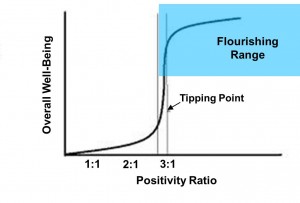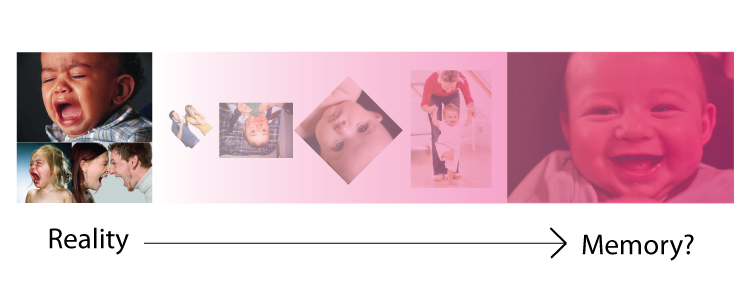Joy begets joy.
You probably know at least a few people who are eternal, effervescent bundles of bliss: no matter how tiring or challenging their day, they just exude happiness. And whenever they enter a room, every person inside it lights up like a holiday tree, catching some of their pleasure, if only momentarily.
Ever wonder what they’re doing differently?
Here’s their ‘secret’, according to Jonathan Haidt, author of The Happiness Hypothesis:
They were born lucky. They won the cortical lottery. Digest these quotes from the research article, Beyond the Hedonic Treadmill:
- Research has shown over and over again “that one’s level of well-being is reasonably stable over time (Eid & Diener, 2004).”
- “Behavioral genetic studies show that well-being is moderately heritable.” Identical twins raised apart “were much more similar in their levels of well-being than were dizygotic [fraternal] twins who were reared apart.” (Tellegen et al. 1988)
- “Whereas any single demographic factor typically correlates less than .2 with well-being reports…. personality tend to correlate much more strongly with well-being.” Personality… changes little over a person’s lifetime (Deiner & Lucas, 1999).
Hmmm. That’s great news for those born happy. Kinda sucks for me.
I definitely didn’t win the cortical lottery.
I lost. Badly. Most people who know me would say I’m an unhinged optimist. I am, but only because I’ve shut my ears to the insecure, critical parts of me that predict failure, that whisper I don’t “measure up” in so many ways, and that success will always be outside my grasp, no matter how far I lean or lunge.
From a cortical perspective, I’m at the low end of the spectrum; I dare to say that most of you were born with far stronger dispositions for happiness, optimism, and joy.
But I didn’t know this until I began to study the matter. For most of my life I blamed others for my unhappiness. I blamed my ‘selfish’ friends, my ‘uncaring’ parents, and my ‘unfaithful’ lovers. I thought my unhappiness and insecurity were of their making. Growing up, we learn that our levels of happiness depend on our actions and the actions of others within our environment. I didn’t think I was doing anything wrong … so the fault simple had to lie elsewhere.
But once I started taking responsibility for my happiness, all this changed. I realized I had abundant love around me all of the time; I just wasn’t able to easily recognize or receive it. I finally realized that I can be happy—wildly, abundantly happy—but only once I take full responsibility for it and stop blaming others.
It’s been difficult – I struggle daily to hold onto this insight.
Peter Sinclair of Motivational Memo summarizes it well. He sent in his response for the blog’s launch post, 29 Happier Humans Share The Secrets To Their Joy, a few days too late. But I loved his answer to the post’s inquiry, “What’s one unusual or unconventional activity or attitude that’s helped you become a happier human?” so much, that I knew I had to feature it:
“I GIVE happiness away…
Nobody else can provide you with happiness. Marriages built upon the premise that ‘it is only a good marriage if my partner makes me happy’ won’t last.
You be the one making other people happy. You bring the joy. You supply the laughter. You walk the extra mile. You be the giver. You be the deliverer. You smile. You take responsibility. You seek to benefit others.
If you begin to live like this you will never be able to outrun the flood of happiness that will flow over and into your life for all your days.”
Make the conscious choice. Be the wellspring of happiness.
For far to long, I lived the other way around. I blamed others for my unhappiness. And every time I did, I surrendered control of my mood and my life to my biology and my genes.
So let’s talk about you. Maybe you’re unhappy, maybe you’re content, or maybe you’re really happy. It doesn’t matter – you can go higher! And NO—it’s not selfish. The best way to ‘improve’ your nagging wife, your unappreciative boss, or your selfish friends is to become happier yourself.
Who else believe this?
Buddhism teaches that, since you can’t control others’ actions, you should remove your attachments to them; they cannot and will not provide consistent happiness. The correct response is to generate happiness from within. To my mind, the idea of removing all attachment is too extreme a response to the unpredictable nature of the world, but the idea of taking personal responsibility for one’s own happiness is golden.
The ancient Greeks and Romans (Aristotle, Plato, Boethius, and others) also believed that relying on others for happiness was a mistake. Their solution differed; they suggested that by acting and thinking virtuously—with wisdom and perspective—humans can generate happiness and fulfillment.
Growing up, I was familiar with both of these schools of thought, but neither appealed to me. The works of ancient westerners seemed more like intellectual and philosophical theories than practical guidebooks. And the works of Buddha—the idea of non-striving—went so against my upbringing that I could never see eye to eye with its radical paradigm.
Positive Psychology spoke to me in a language that nothing else did, in the language of science, numbers, and—most importantly—prose written by modern Americans. The solutions the ancients came up with, both from the east and from the west, have become a part of the language I’m just now learning. One thing all three agree on is that YOU must be the wellspring of your own happiness. Quoting Peter again, “Nobody else can provide you with happiness.”
But is the rest of what he said really true? Will living as a wellspring truly create a “flood of happiness that will flow over and into your life for all your days?”
Yes! Even though happiness is based on a unique set-point within the structure of our individual DNA, just a slight internal change in perspective can lead to monumental change. The experience of happiness itself triggers massive positive feedback loops that seek to engender more of the same: well-being and joy.
Let me give you three quick examples.
1. The Losada Ratio Creates Flourishing (or Floundering)

What we get from a relationship can be summarized by the Losada Ratio (see my review of the research). When the sum of the positives (encouragement, appreciation, smiles) are three times greater than the sum of the negatives (criticism, contempt, defensiveness, stonewalling), a relationship is significantly more likely to flourish. Dr. Gottman, a marriage scientist, claims he can predict the likelihood of divorce between two spouses with a 94% success rate based solely on this ratio!
The average person has a Losada ratio of 1.9 (below optimal): one-third of their comments are negative. So … if we want our relationship with average individuals to flourish (or negative ones like me 🙂 ), what should we do? Complain that they’re not positive enough; that they don’t appreciate us enough; that they don’t give enough to the relationship? NO. Doing so will only make matters worse. The best course of action is to give away our own happiness.
Barbara Frederickson observed that a Losada Ratio of 3 puts your relationship near the top, where trust and happiness bloom. If you want to bump the 1.9 up to 3, complaining will just lower the number. Instead, increasing your positive comments by just 25% will get things flourishing. And when your relationship is flourishing, you’ll get much more joy out of it.
2. Network Effects Spread Happiness (or Unhappiness)
Emotions are contagious. Scientists are still debating the how and why, but we all know this intuitively. When we talk to someone sad, we tend to get depressed ourselves. When we talk to someone filled with joy, we just can’t help but feel a little better after talking to them.
I’ve used the word wellspring four times so far. Perhaps it’s time to define it so we’re on the same page.
Wellspring – an original and bountiful source of something
Guess what? Happiness is the most contagious emotion – it is, by its very nature, a wellspring.
Within a relationship, if you changed from being happy to very happy, a reciprocal friend (someone that considers you a friend whom you also consider a friend) is 20%-120% more likely to also become very happy. The percentage depends on a number of variables (including age and gender difference, geographic distance, and how many mutual friends you have), but you have a lot of control over another person’s level of happiness – 20% to 120% is A LOT.
Using myself as an example, if I changed from being happy to very happy, I would have more than a 95% chance of bringing at least one of my friends along with me. Keeping in mind the Losada Ratio, that would mean our relationship would improve dramatically – with both of us subsequently providing more positivity.
3. A Rose Colored Lens Keeps us Happy (or Unhappy)

A common thread throughout positive psychology, cognitive science, social psychology, and behavioral economics is that the world is not as it seems to each of us. Humans are far less conscious that we believe ourselves to be. One consequence of this is that our mood heavily influences our perception of reality.
When you blame others for your unhappiness, you’ve already lost, because your perception fuels a self-fulfilling prophecy. We humans seek out information that confirms our existing beliefs. If we think of others as unappreciative, we’ll hone in on their unintentional slights while filtering out or explaining away their compliments.
It’s worse than that. Ever notice that happy people are more agreeable, while unhappy people are more stubborn and defensive? It’s called the broaden-and-build theory. If you’re already in a bad, blaming mood, you’re even less likely to change your mind, even if your spouse or your kids try to talk things out with you. On the other hand, if you’re happy you’re much more likely to accept you’ve been making some mistakes, and start noticing their smiles and their compliments. Once again, the best way to get happiness from others is to become happy yourself.
We don’t really need complicated ideas like emotional contagion, the Losada ratio, and cognitive biases to describe what’s going on. Happiness begets happiness. Positivity begets positivity. By virtue of the golden rule, we are more likely to receive positivity when we provide it.
The first step is acceptance. Accept that the largest mood influencer isn’t the truth or the environment you grew up in – it’s your genes. From there, it’s all you.
The article was originally posted at happierhuman.com, republished with the conset of the author.


Comments